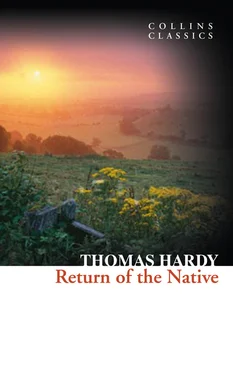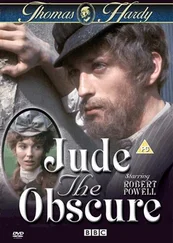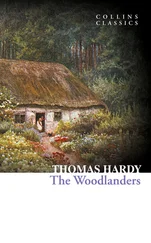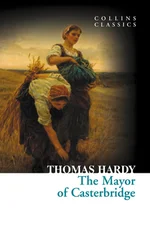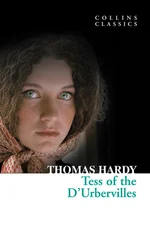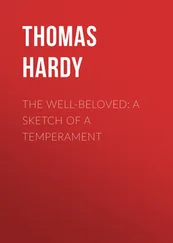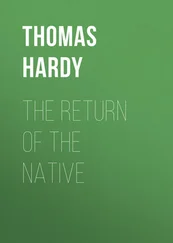“A hundred maidens would have had him if he’d asked ’em,” said the wide woman.
“Didst ever know a man, neighbour, that no woman at all would marry?” inquired Humphrey.
“I never did,” said the turf-cutter.
“Nor I,” said another.
“Nor I,” said Grandfer Cantle.
“Well, now, I did once,” said Timothy Fairway, adding more firmness to one of his legs. “I did know of such a man. But only once, mind.” He gave his throat a thorough rake round, as if it were the duty of every person not to be mistaken through thickness of voice. “Yes, I knew of such a man,” he said.
“And what ghastly gallicrow might the poor fellow have been like, Master Fairway?” asked the turf-cutter.
“Well, ’a was neither a deaf man, nor a dumb man, nor a blind man. What ’a was I don’t say.”
“Is he known in these parts?” said Olly Dowden.
“Hardly,” said Timothy; “but I name no name. … Come, keep the fire up there, youngsters.”
“Whatever is Christian Cantle’s teeth a-chattering for?” said a boy from amid the smoke and shades on the other side of the blaze. “Be ye a-cold, Christian?”
A thin jibbering voice was heard to reply, “No, not at all.”
“Come forward, Christian, and show yourself. I didn’t know you were here,” said Fairway, with a humane look across towards that quarter.
Thus requested, a faltering man, with reedy hair, no shoulders, and a great quantity of wrist and ankle beyond his clothes, advanced a step or two by his own will, and was pushed by the will of others half a dozen steps more. He was Grandfer Cantle’s youngest son.
“What be ye quaking for, Christian?” said the turf-cutter kindly.
“I’m the man.”
“What man?”
“The man no woman will marry.”
“The deuce you be!” said Timothy Fairway, enlarging his gaze to cover Christian’s whole surface and a great deal more, Grandfer Cantle meanwhile staring as a hen stares at the duck she has hatched.
“Yes, I be he; and it makes me afeard,” said Christian. “D’ye think ’twill hurt me? I shall always say I don’t care, and swear to it, though I do care all the while.”
“Well, be damned if this isn’t the queerest start ever I know’d,” said Mr. Fairway. “I didn’t mean you at all. There’s another in the country, then! Why did ye reveal yer misfortune, Christian?”
“’Twas to be if ’twas, I suppose. I can’t help it, can I?” He turned upon them his painfully circular eyes, surrounded by concentric lines like targets.
“No, that’s true. But ’tis a melancholy thing, and my blood ran cold when you spoke, for I felt there were two poor fellows where I had thought only one. ’Tis a sad thing for ye, Christian. How’st know the women won’t hae thee?”
“I’ve asked ’em.”
“Sure I should never have thought you had the face. Well, and what did the last one say to ye? Nothing that can’t be got over, perhaps, after all?”
“‘Get out of my sight, you slack-twisted, slim-looking maphrotight fool,’ was the woman’s words to me.”
“Not encouraging, I own,” said Fairway. “‘Get out of my sight, you slack-twisted, slim-looking maphrotight fool,’ is rather a hard way of saying No. But even that might be overcome by time and patience, so as to let a few grey hairs show themselves in the hussy’s head. How old be you, Christian?”
“Thirty-one last tatie-digging, Mister Fairway.”
“Not a boy—not a boy. Still there’s hope yet.”
“That’s my age by baptism, because that’s put down in the great book of the Judgment that they keep in church vestry; but Mother told me I was born some time afore I was christened.”
“Ah!”
“But she couldn’t tell when, to save her life, except that there was no moon.”
“No moon—that’s bad. Hey, neighbours, that’s bad for him!”
“Yes, ’tis bad,” said Grandfer Cantle, shaking his head.
“Mother know’d ’twas no moon, for she asked another woman that had an almanac, as she did whenever a boy was born to her, because of the saying, ‘No moon, no man’, which made her afeard every man-child she had. Do ye really think it serious, Mister Fairway, that there was no moon?”
“Yes. ‘No moon, no man.’ ’Tis one of the truest sayings ever spit out. The boy never comes to anything that’s born at new moon. A bad job for thee, Christian, that you should have showed your nose then of all days in the month.”
“I suppose the moon was terrible full when you were born?” said Christian, with a look of hopeless admiration at Fairway.
“Well, ’a was not new,” Mr. Fairway replied, with a disinterested gaze.
“I’d sooner go without drink at Lammas-tide than be a man of no moon,” continued Christian, in the same shattered recitative. “’Tis said I be only the rames of a man, and no good for my race at all; and I suppose that’s the cause o’t.”
“Ay,” said Grandfer Cantle, somewhat subdued in spirit; “and yet his mother cried for scores of hours when ’a was a boy, for fear he should outgrow hisself and go for a soldier.”
“Well, there’s many just as bad as he.” said Fairway.
“Wethers must live their time as well as other sheep, poor soul.”
“So perhaps I shall rub on? Ought I to be afeared o’ nights, Master Fairway?”
“You’ll have to lie alone all your life; and ’tis not to married couples but to single sleepers that a ghost shows himself when ’a do come. One has been seen lately, too. A very strange one.”
“No—don’t talk about it if ’tis agreeable of ye not to! ’Twill make my skin crawl when I think of it in bed alone. But you will—ah, you will, I know, Timothy; and I shall dream all night o’t! A very strange one? What sort of a spirit did ye mean when ye said, a very strange one, Timothy?—no, no—don’t tell me.”
“I don’t half believe in spirits myself. But I think it ghostly enough—what I was told. ’Twas a little boy that zid it.”
“What was it like?—no, don’t—”
“A red one. Yes, most ghosts be white; but this is as if it had been dipped in blood.”
Christian drew a deep breath without letting it expand his body, and Humphrey said, “Where has it been seen?”
“Not exactly here; but in this same heth. But ’tisn’t a thing to talk about. What do ye say,” continued Fairway in brisker tones, and turning upon them as if the idea had not been Grandfer Cantle’s—“what do you say to giving the new man and wife a bit of a song tonight afore we go to bed—being their wedding-day? When folks are just married ’tis as well to look glad o’t, since looking sorry won’t unjoin ’em. I am no drinker, as we know, but when the womenfolk and youngsters have gone home we can drop down across to the Quiet Woman, and strike up a ballet in front of the married folks’ door. ’Twill please the young wife, and that’s what I should like to do, for many’s the skinful I’ve had at her hands when she lived with her aunt at Blooms-End.”
“Hey? And so we will!” said Grandfer Cantle, turning so briskly that his copper seals swung extravagantly. “I’m as dry as a kex with biding up here in the wind, and I haven’t seen the colour of drink since nammet-time today. ’Tis said that the last brew at the Woman is very pretty drinking. And, neighbours, if we should be a little late in the finishing, why, tomorrow’s Sunday, and we can sleep it off?”
“Grandfer Cantle! you take things very careless for an old man,” said the wide woman.
“I take things careless; I do—too careless to please the women! Klk! I’ll sing the ‘Jovial Crew’, or any other song, when a weak old man would cry his eyes out. Jown it; I am up for anything.
Читать дальше
